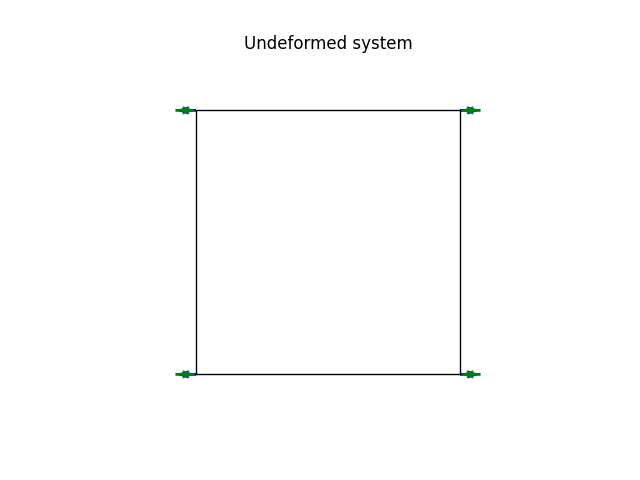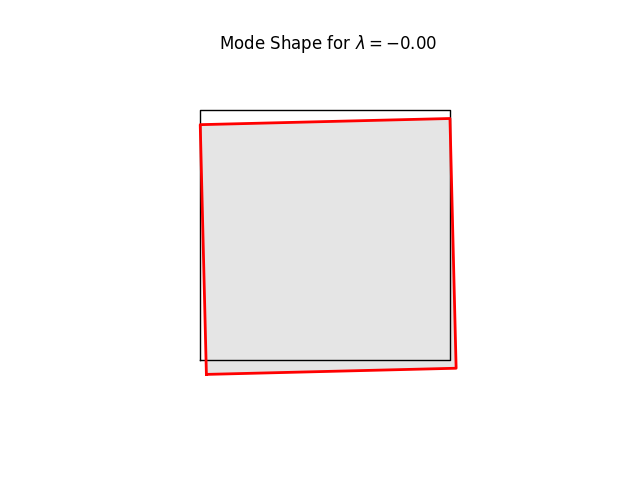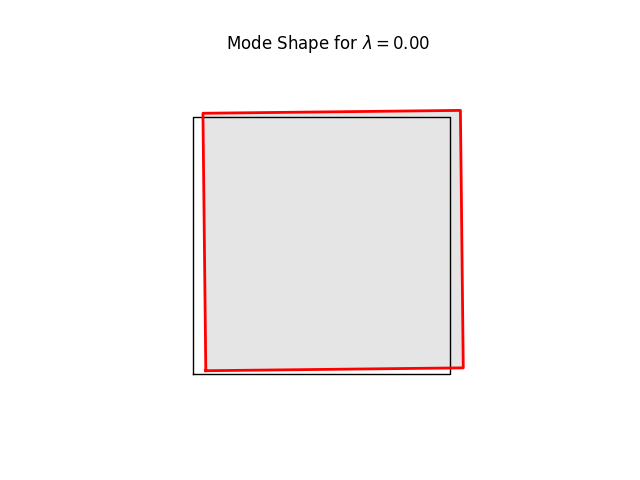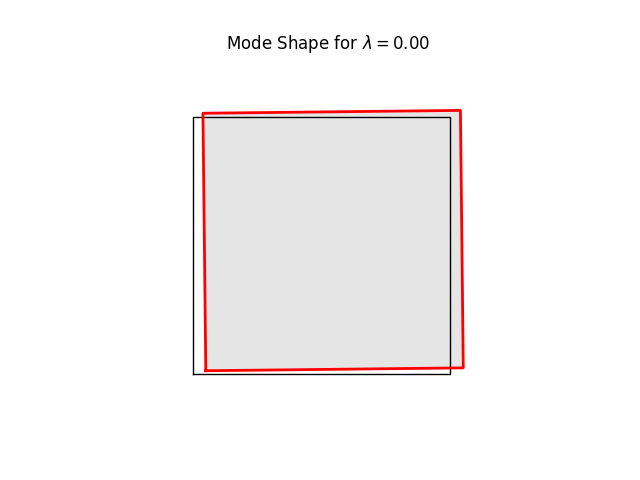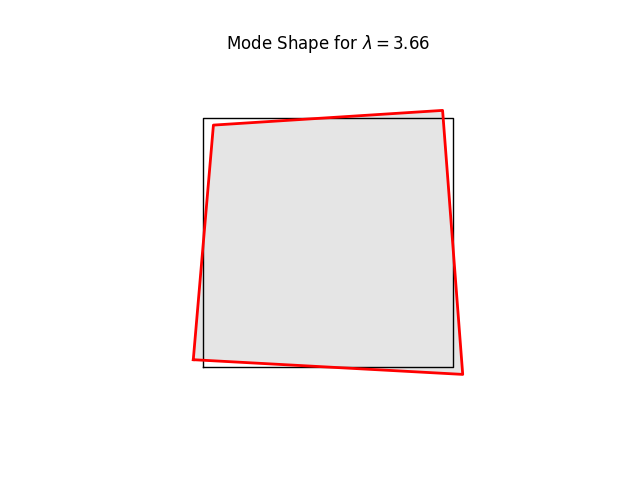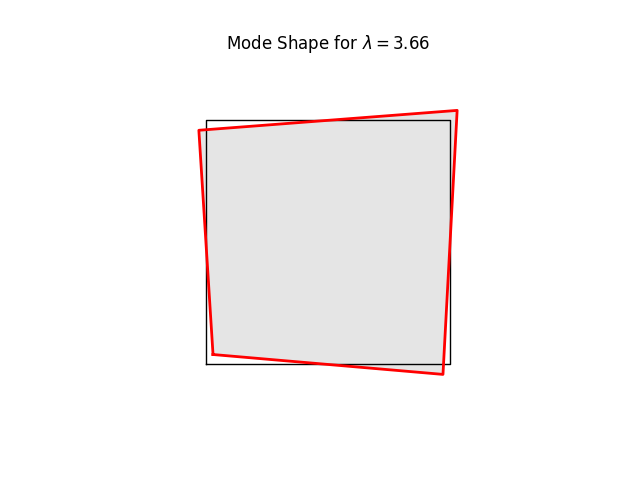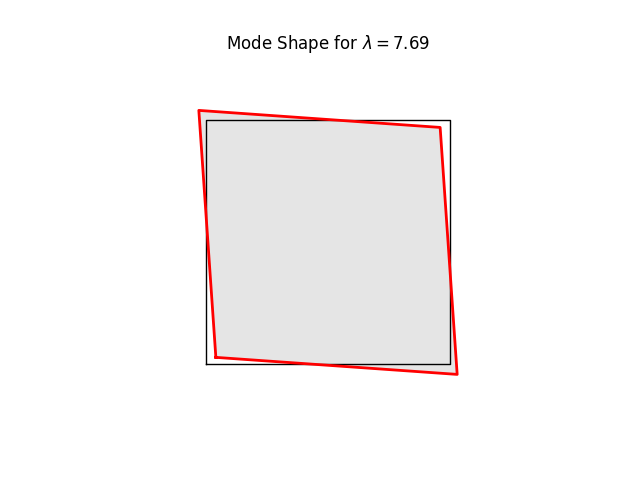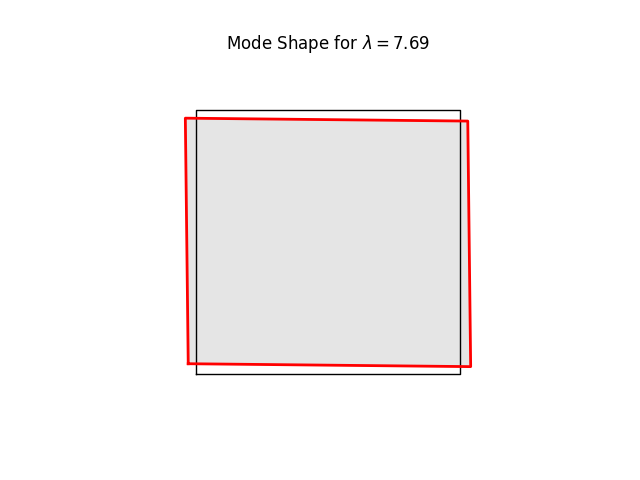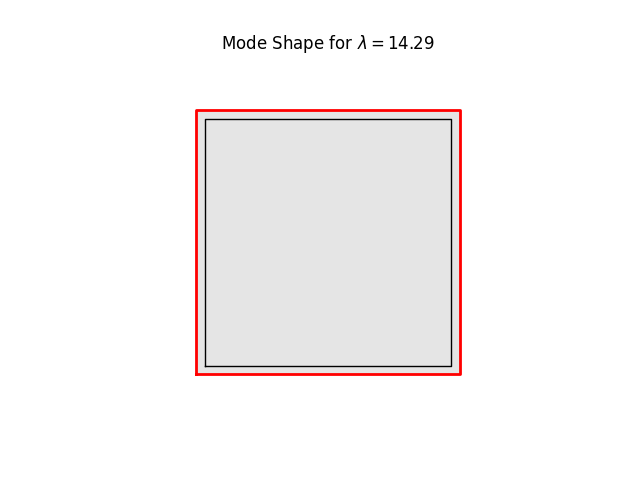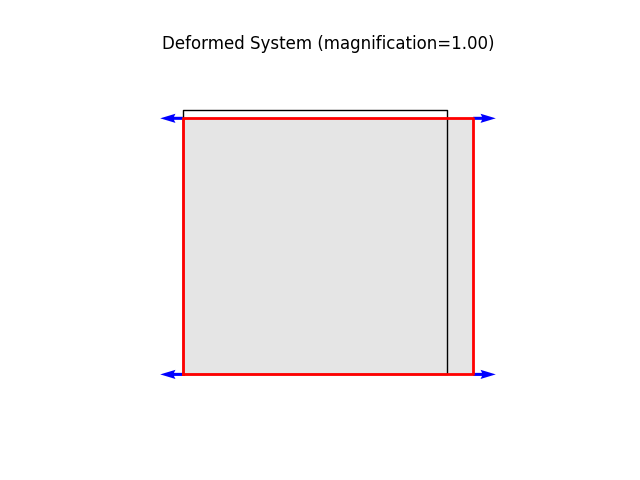Note
Go to the end to download the full example code.
A square patch made of one quadrilateral plate elements
- Basic implementation test with applied loads.
Testing the tangent stiffness computation.
free free
^ ^
| |
3-----2 -> free
| | >
| a | > (w = 1.0)
| | >
0-----1 -> free
width: 10.
height: 10.
Material parameters: St. Venant-Kirchhoff, plane stress
E = 10.0
nu = 0.30
t = 1.0
Element loads:
node 0: [ 0.0, 0.0]
node 1: [10.0, 0.0]
node 2: [10.0, 10.0]
node 3: [ 0.0, 0.0]
Author: Peter Mackenzie-Helnwein
import numpy as np
from femedu.examples import Example
from femedu.domain import System, Node
from femedu.solver import NewtonRaphsonSolver
#from femedu.elements.linear import Quad
from femedu.elements.linear import ReducedIntegrationQuad as Quad
from femedu.materials import PlaneStress
class ExamplePlate07(Example):
def problem(self):
params = dict(
E = 10., # Young's modulus
nu = 0.3, # Poisson's ratio
t = 1.0, # thickness of the plate
fy = 1.e30 # yield stress
)
a = 10. # length of the plate in the x-direction
b = 10. # length of the plate in the y-direction
model = System()
model.setSolver(NewtonRaphsonSolver())
nd0 = Node( 0.0, 0.0)
nd1 = Node( a, 0.0)
nd2 = Node( a, b)
nd3 = Node( 0.0, b)
# nd0.fixDOF('ux', 'uy')
# nd1.fixDOF('uy')
# nd3.fixDOF('ux')
model.addNode(nd0, nd1, nd2, nd3)
elemA = Quad(nd0, nd1, nd2, nd3, PlaneStress(params))
model.addElement(elemA)
elemA.setSurfaceLoad(face=1, pn=1.0)
elemA.setSurfaceLoad(face=3, pn=1.0)
model.plot(factor=0.0, title="Undeformed system", filename="plate07_undeformed.png", show_bc=1)
# %%
# We can have a quick look at the stiffness mode shapes using the
# buckling-mode plotter. These are simply eigenvalues and eigenvectors of Kt
# at the current load level (0.0)
#
model.setLoadFactor(0.0)
model.solve()
np.save('../../../Kplate.npy', model.solver.Kt)
for k in range(8):
name = f"plate07_mode{k:2d}.png"
model.plotBucklingMode(mode=k,filename=name,factor=1.0)
# %%
# Note the three rigid body modes (lam=0.0). It can be shown that all three
# are linear combinations of translations in x and y-directions and a
# rigid body rotation.
#
# %%
# Now it is time to add boundary conditions, apply loads
# and check the convergence behavior.
#
nd0.fixDOF('ux', 'uy')
nd1.fixDOF('uy')
#nd3.fixDOF('ux')
model.setLoadFactor(1.0)
model.solve()
# %%
# The output shows that we do have a quadratic rate of convergence.
# %%
# Let's finish off with a nice plot of the deformed system.
model.plot(factor=1.0, filename="plate07_deformed.png")
model.report()
Run the example by creating an instance of the problem and executing it by calling Example.run()
if __name__ == "__main__":
ex = ExamplePlate07()
ex.run()
+
+
/Users/pmackenz/Development/Educational/FEM.edu/venv/lib/python3.13/site-packages/matplotlib/quiver.py:678: RuntimeWarning: Mean of empty slice.
amean = a.mean()
/Users/pmackenz/Development/Educational/FEM.edu/venv/lib/python3.13/site-packages/numpy/_core/_methods.py:145: RuntimeWarning: invalid value encountered in scalar divide
ret = ret.dtype.type(ret / rcount)
System Analysis Report
=======================
Nodes:
---------------------
Node_610:
x: [0.000 0.000]
fix: ['ux', 'uy']
u: [0.000 0.000]
Node_611:
x: [10.000 0.000]
fix: ['uy']
u: [1.000 0.000]
Node_612:
x: [10.000 10.000]
u: [1.000 -0.300]
Node_613:
x: [0.000 10.000]
u: [-0.000 -0.300]
Elements:
---------------------
ReducedIntegrationQuad_838: nodes ( Node_610 Node_611 Node_612 Node_613 )
material: list
strain (0): xx=1.000e-01 yy=-3.000e-02 xy=-3.369e-17 zz=-2.100e-02
stress (0): xx=1.000e+00 yy=0.000e+00 xy=-1.296e-16 zz=0.000e+00
strain (1): xx=1.000e-01 yy=-3.000e-02 xy=-3.369e-17 zz=-2.100e-02
stress (1): xx=1.000e+00 yy=0.000e+00 xy=-1.296e-16 zz=0.000e+00
strain (2): xx=1.000e-01 yy=-3.000e-02 xy=-3.369e-17 zz=-2.100e-02
stress (2): xx=1.000e+00 yy=0.000e+00 xy=-1.296e-16 zz=0.000e+00
strain (3): xx=1.000e-01 yy=-3.000e-02 xy=-3.369e-17 zz=-2.100e-02
stress (3): xx=1.000e+00 yy=0.000e+00 xy=-1.296e-16 zz=0.000e+00
Total running time of the script: (0 minutes 0.222 seconds)
